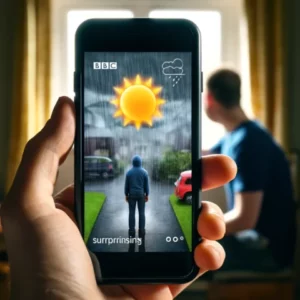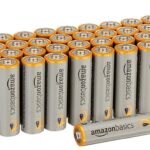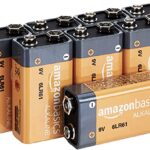The Samsung Galaxy Tab S7 is the Tab S7 series’ younger sibling. With the tablet market dominated by low-cost offerings, it’s interesting to see a premium flagship in the Smartphone space.
In August, Samsung released the Galaxy Tab S7 duo alongside the Galaxy Note 20 lineup. And, with its latest tablet devices, Samsung has attempted to address the majority of the issues that users had with the Galaxy Tab S6. I’ve had the Galaxy Tab S7 for almost a month now, and here’s my take on Samsung’s latest flagship tablet.
To begin, the Galaxy Tab S7 is among the finest LCD screens available. You get an 11-inch display with a 16:10 aspect ratio, making it one of the best for media consumption. The 120Hz refresh rate is the icing on the cake. You also get one of the finest quad-speaker setups on board, which adds to the fun. The design is very good here, with a slim metal slab.
What you will see here?
Design
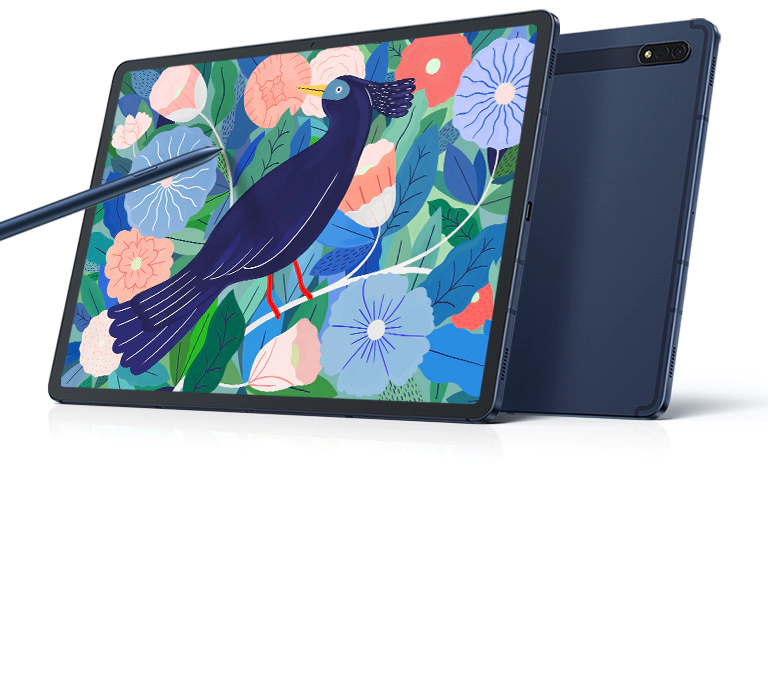
The premium build and design of Samsung’s flagship products are well-known. The same is true for the Tab S7 series. You can experience it as soon as you take the tablet out of the box—it feels like a solid block of metal.
The tablet really does have a brushed metal finish that extends all the way around the edges. The Galaxy Tab S7 weighs 500 grams and is only 6.3mm thick. The weight distribution is also fairly balanced in this and doesn’t feel top or bottom-heavy. There is also no flex on the tablet. It feels and looks premium in every way. There are also brushed metal sides.Â
The display is 11-inch with a 16:10 aspect ratio and a similar proportion of bezel on all four sides. When you keep the tab in landscape mode, the selfie camera appears on top. The USB 3.2 Type-C port is located to the right of the tablet, and there is a magnetic connector at the bottom to connect to Samsung’s keyboard.
The onboard fingerprint scanner isn’t the fastest we’ve seen, but it gets the job done. It is more conveniently located in the top left corner, which makes things a little easier, especially on a tablet. The back of the tablet is a fingerprint magnet, and the Mystic Black color we used attracts smudges easily.
Display
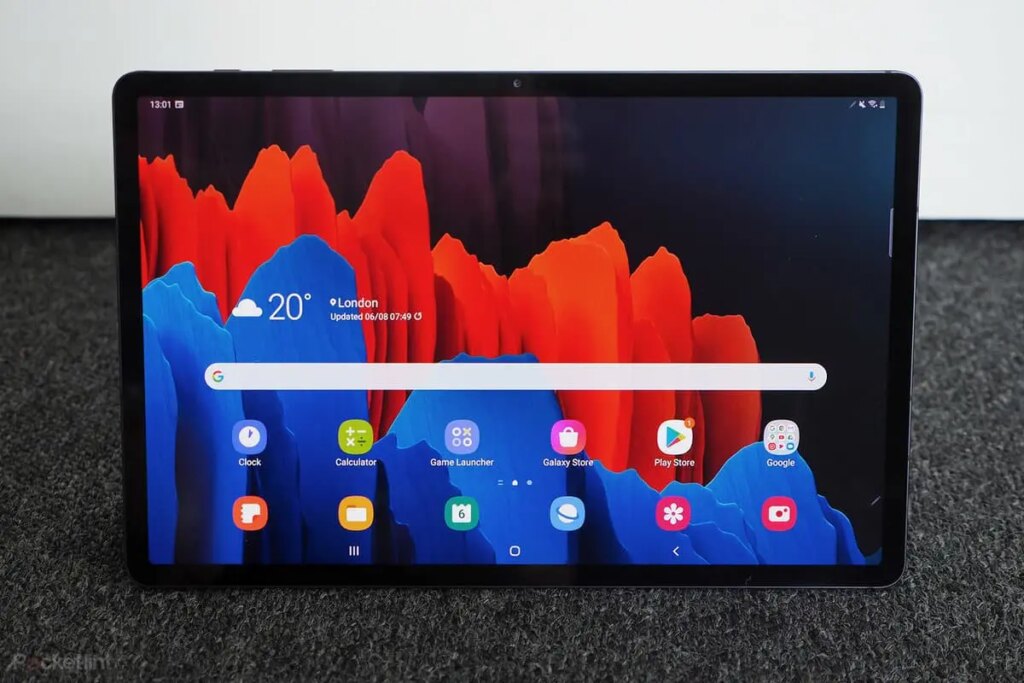
The Samsung Galaxy Tab S7 has an 11-inch display with a refresh rate of 120Hz. It is an LCD panel with a resolution of 2,560 x 1,600 and a pixel density of 276ppi. The aspect ratio is 16:10 in this case. The Tab S7 Plus, on the other hand, has a larger 12.4-inch AMOLED panel with 120Hz.
The Galaxy Tab S7’s LCD panel is also one of the best I’ve seen, producing rich color and being vivid. The tablet’s viewing angles are also excellent, making all binge-watching more enjoyable. The 16:10 aspect ratio is ideal for watching television and movies. However, when streaming on most OTT apps such as Disney Plus, Hotstar, Prime Video, and YouTube, you will notice back bars on the top and bottom of the screen. Only Netflix allowed me to zoom in and cover-up those screens, resulting in a more immersive experience.
The display becomes sufficiently bright for all indoor activities such as reading, watching media, gaming, doodling, and taking notes. However, this is not the case when used outside. For starters, the display is a fingerprint magnet, making it extremely difficult to keep clean all of the time. Furthermore, the sunlight readability is poor in this location. When you watch a video outside on a tablet, you will notice your own mirror image more than the real content on the tablet.
As a whole, the display is really quite nice and entertaining for the most part, with the cherry on top being the 120Hz refresh rate, which makes all of the animation and transitions smooth across the UI. You can select between a 60Hz standard refresh rate and a 120Hz adaptive refresh rate.
Performance
The tablet’s performance is one of its main selling points. The Samsung Galaxy Tab S7 is equipped with the latest Snapdragon 865 Plus SoC, which is manufactured on a 7nm process. It is an octa-core chipset with CPU cores that can run at speeds of up to 3.1GHz. The Adreno 650 GPU is in charge of graphics. This is complemented by 6GB of RAM and 128GB of onboard storage. You get a micro SD card slot, which expands the memory to 1TB.
The Snapdragon 865 Plus handles every activity you put at with ease, as you’d expect from a flagship-grade chipset. Opening casual apps, taking notes, using social media apps, streaming videos, or maybe even playing games are all possibilities. They’re all handled well here. The 120Hz smooth panel is also a plus here, providing a fluid experience.
Samsung’s DeX Mode has also significantly improved since the last time you use it. While Chrome still does not open desktop versions of websites by default and prompts me to download Android apps for some Google services, Samsung’s built-in browser opens desktop versions of Google Docs, Slides, and Sheets without any problems. One feature I still wished for while using DeX Mode was the capacity to split browser windows and open them in separate windows, which would necessitate launching another instance of the app.
S Pen
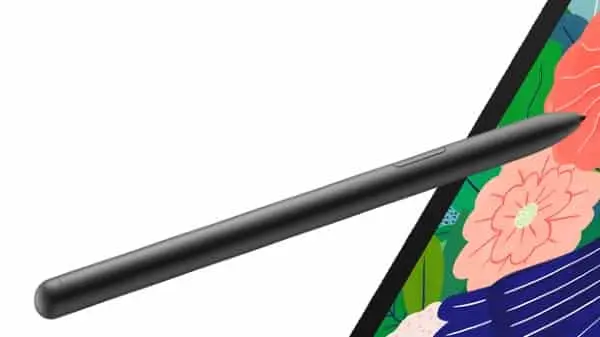
The S Pen made its return to Samsung tablets last year with the Tab S6 and the Tab S7 series already getting the S Pen inside the box. The S Pen has some new tricks up its sleeve. For beginners, the S Pen now has ultra-low latency, giving you a pen-and-paper feel.
The S Pen is slightly taller than a regular pen and a bit shorter than most pencils. The sharp tip is at the bottom, and the S Pen is flat with one side so that it can be easily changed. Holding the S Pen and writing notes while navigating through the UI is a breeze. The touch response time and latency are both excellent. The operations are nearly instantaneous.
The S Pen’s button could be used to dominate the media which is being played on the tablet. It worked fantastically well with YouTube. The gestures will then be used to control the volume, seeking, and play/pause functions. However, I did find these to be overly gimmicky and did not always work as intended.
Overall, the S Pen adds value to the entire package and improves the tablet experience. You also get this for complimentary in the box, which is an added bonus.
Cameras
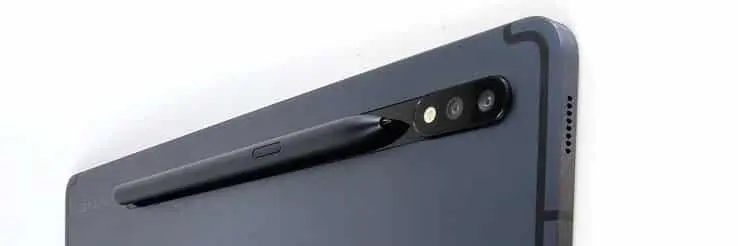
Let’s start with the selfie camera because it’s more valuable on a tablet of this size. You get an 8MP camera that sits on top of the screen when held in landscape mode. This positioning is both clever and practical. It also gives the impression of a laptop. The front-facing camera is ideal for video calls and conferences. The front camera also has a wide-angle mode.
On the back, there’s a dual-camera setup with a 13MP primary shooter and a 5MP wide-angle camera. The rear camera is pretty average, as it tends to lose details when zoomed in. The colors are accurate, but the overall detail is lacking. If you normally capture images with a tablet camera, you’ll have to make do with an ordinary camera here. However, this should not be your primary app or a deal-breaker. The front camera can record videos in Full HD, while the rear camera can record in 4K @ 30fps.
Battery
The Samsung Galaxy Tab S7 has a large 8,000mAh battery that can power it through a typical workday. On days when I only used the tablet for work, it had an SoT of about 9.5 hours with the refresh rate set to 60Hz and the brightness set to 75%. With the same usage, switching to 120Hz reduced the SoT to about 7.5 hours. My typical workday consists of writing articles, just doing some light photo editing, and trying to check Slack, Asana, and Gmail for upgrades in between. Your mileage may vary when you’re doing something more performance-intensive.
The Samsung Galaxy Note 20 Ultra, for example, achieves a score of 10 hours and 35 minutes in the same test, whereas my unit rarely achieves more than 6 hours of SoT.
Conclusion
The Samsung Galaxy Tab S7 is a major improvement over the Galaxy Tab S6, and it remains an excellent choice for artists and those looking for a portable media device.
Samsung has been trying for a long time to make the Galaxy Tab S-series slates a big deal, and if the Tab S6 Lite was the company’s 1st true home run, the Tab S7 is yet another homer with a couple of runners on base. From its excellent bright and sharp screen to its high-quality design, this is a tablet that Apple fans may refer to as an iPad Pro clone, but it’s one that Android users should consider.
Read more:
- Lenovo Yoga Tab 11: Full-on Entertainment!
- Best Features Of The Samsung Galaxy Note 20 Review
- Xbox One S Review- Is it worth your money?
- iPhone 13 Pro Review- Super features in this superphone!
- iPhone 13 Pro Max – Every detail you should know about this Giant Tech!









